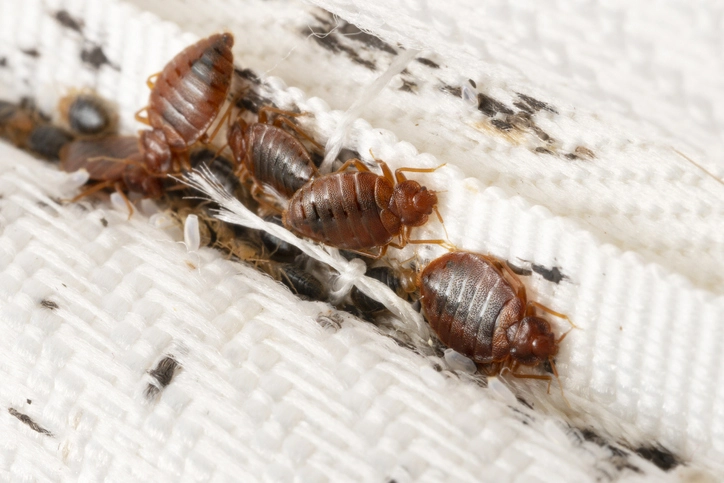EZ Bed Bugs Extermination NYC: Specialist Services for Full Bug Removal
EZ Bed Bugs Extermination NYC: Specialist Services for Full Bug Removal
Blog Article
The Function of Appropriate Hygiene Practices in Pest Control
Efficient insect control goes beyond simply extermination methods; it entails a strategic technique that deals with the source of infestations. One vital element typically undervalued is the function of proper hygiene methods in keeping pests at bay. The web link between cleanliness and pest control is obvious, yet many neglect its relevance. By understanding exactly how sanitation straight affects pest visibility, we can reveal the key to long-term insect monitoring services.
Importance of Sanitation in Pest Prevention
Sanitation plays an important function in avoiding insect problems by removing food and water sources that attract undesirable insects. Appropriate sanitation techniques are foundational in pest control as they directly influence the accessibility of sources that pests call for to make it through and reproduce. By keeping locations clean and totally free of food debris, spills, and standing water, the possibility of parasites locating an appropriate setting to thrive is significantly minimized.
A proactive strategy to sanitation involves routine cleaning and maintenance routines to make certain that all spaces remain unappealing to insects. This consists of appropriate waste monitoring, timely elimination of waste, and sealing food containers to deny access to parasites (EZ nyc bed bug exterminator). Furthermore, taking care of dripping pipes, fixing crevices and splits, and maintaining a clutter-free atmosphere are vital action in insect avoidance with sanitation
Failure to support high cleanliness requirements can cause a rise in pest task, posturing health risks and residential property damage. Prioritizing hygiene techniques is not only important for parasite control however additionally for overall wellness and wellness.
Typical Hygiene Errors to Avoid
In keeping high standards of cleanliness to discourage parasite problems, vigilance against usual sanitation blunders is paramount for reliable parasite control administration. Leaving food out in the open or not securing it effectively can attract bugs like pests and rats. By preventing these usual hygiene mistakes and applying proper sanitation practices, bug problems can be significantly reduced.

Effect of Appropriate Waste Disposal
Proper waste disposal plays a crucial role in keeping a sanitary atmosphere and preventing pest invasions. By making sure that waste is correctly contained and disposed of in secured containers, the chance of bring in parasites is substantially minimized.
Improper waste disposal can also lead to an increase in bug populations. Pests frequently locate resources of food and shelter in incorrectly thrown away waste, allowing them to breed and increase quickly. This can produce a cycle where insects become established in an area due to the schedule of sources from poorly managed waste.
In addition to bring in pests, improper garbage disposal can likewise damage the atmosphere. Leachate from garbage dumps can contaminate dirt and water resources, influencing environments and possibly hurting wildlife - EZ bed bug exterminator nyc. Correct waste disposal methods, such as reusing, composting, and utilizing assigned waste disposal services, are important in minimizing these adverse impacts and promoting a much healthier atmosphere for both people and wildlife

Function of Sanitation in Parasite Administration
Keeping sanitation is vital for effective insect administration strategies. Cleanliness plays an essential function in protecting against parasites from infesting homes, companies, and public areas. When locations are kept clean and free of food residues, water resources, and clutter, insects like rats, pests, and flies are much less most likely to discover ideal settings for harborage and reproduction. Routine cleansing routines, appropriate waste disposal, and prompt spill clean-up are important techniques in minimizing pest destination.

Integrating Cleanliness With Insect Control Programs
Efficient EZ best bed bug removal pest control programs integrate extensive cleanliness techniques to produce inhospitable settings for bugs to grow. Integrating hygiene with pest control programs involves carrying out proactive procedures to eliminate elements that bring in and maintain parasite populaces. This integration needs a detailed understanding of the insect varieties, their habits, and the problems that support their survival. By attending to cleanliness issues such as food and water resources, shelter, and waste administration, insect control initiatives can be considerably enhanced.
Cleanliness techniques should be an important component of parasite control strategies in various settings, including domestic, business, and agricultural atmospheres. Routine cleansing, correct garbage disposal, and maintenance of facilities are vital components of an effective pest monitoring strategy. By constantly incorporating cleanliness practices into parasite control programs, the dependence on chemical therapies can be decreased, leading to even more sustainable and eco-friendly parasite management solutions.
Moreover, integrating cleanliness with pest control programs not just aids in protecting against parasite infestations yet also promotes overall health and hygiene. By preserving sanitation and applying sanitation steps, the threat of pest-borne conditions can be lowered, developing much safer and healthier environments for inhabitants.
Conclusion
To conclude, proper hygiene techniques play an important role in efficient pest control by removing food and water sources that attract parasites. By avoiding typical cleanliness blunders and implementing correct waste disposal techniques, sanitation can significantly affect pest monitoring initiatives. EZ nyc bed bug exterminator. Incorporating sanitation with parasite control programs can aid develop a sustainable and long-lasting solution to avoid problems and maintain a healthy and balanced environment
Correct sanitation techniques are fundamental in insect control as they directly impact the schedule of sources that pests require to endure and reproduce.In keeping high standards of cleanliness to prevent pest infestations, watchfulness against common sanitation errors is extremely important for effective pest control management.Efficient parasite control programs include complete cleanliness practices to create inhospitable atmospheres for parasites to flourish. By consistently including sanitation methods right into insect control programs, the dependence on chemical therapies can be minimized, leading to even more environmentally friendly and lasting parasite management solutions.
In verdict, correct cleanliness techniques play an important role in effective parasite control by removing food and water resources that attract pests.
Report this page